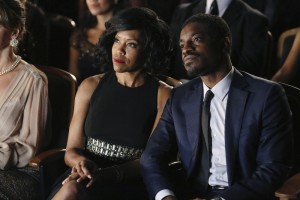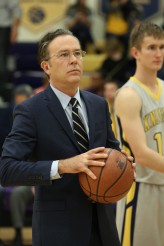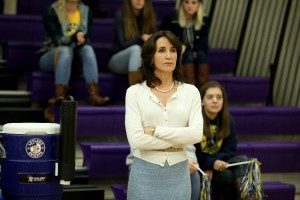Season 1 of ABC Network’s AMERICAN CRIME was nominated for a Best Limited Series Emmy, and took home the gold for Regina King’s Supporting Actress performance. King is back in AMERICAN CRIME Season 2, which airs Wednesdays at 10 PM, but she – like returning cast mates Timothy Hutton, Felicity Huffman, Richard Cabral, Lili Taylor and Elvis Nolasco – is playing an entirely different character this year.
Unlike the first season, which dealt with a racially-charged murder investigation, AMERICAN CRIME’s second year concerns the fallout after male high school student Taylor (Connor Jessup) is apparently raped by at least one of the players on his school’s basketball team.
Michael J. McDonald executive produces AMERICAN CRIME with series creator John Ridley (who wrote the screenplay for 12 YEARS A SLAVE). McDonald started his career as an assistant to Sam Raimi, who eventually promoted him to producer on HERCULES and XENA, as well as several other series. McDonald then spent about a decade as a network executive, mentored by ABC’s Paul Lee. However, McDonald says, “I always tried to get back to my roots and my desire to be a producer.”
In a phone interview, McDonald goes into detail about his CRIME work.
AX: How did you get together with John Ridley?
MICHAEL J. McDONALD: ABC and I had the idea of doing a show about a real-life event and doing it about the people around the event. It stemmed out of the Trayvon Martin trial and the Jodi Arias trial and our obsession about those trials and all the people that surrounded it without having to deal with the trial itself. And John was somebody that I was a huge fan of, so I called him and asked him to lunch, and we found ourselves to have a lot of things in common, including our love of true crime documentaries, about not the crimes themselves, but about the victims and the accused, including the Central Park Five and THE STAIRCASE and a lot of different ways to tell crime stories that are fact- and evidence-based. So that’s how it started.
[Ridley] was absolutely my first choice. I knew I wanted to tackle race and the judicial system, and John not only was a wonderful writer, and I had just read the 12 YEARS A SLAVE manuscript, but also I’ve been a huge fan of his political commentary over the last few years, and his untraditional approach to race and politics in America. I’ve been a fan of his on MSNBC and Salon and Huffington Post and a lot of the stuff he has commented on.
AX: What are your specific duties as executive producer, and how do you collaborate with John Ridley on the show?
McDONALD: I, in partnership with John, oversee all the creative, the scripts, the outlines. Both John and I move to Austin for the duration of the shooting. Either he or I were on set every day. I do editorial work in collaboration with John. I’m the manager of all things, of all detail, with obviously the huge support of producers underneath me, but I liken myself to the man who helps John get his vision on the screen and his creative partner in every step of the way.
AX: With both seasons of AMERICAN CRIME, do you feel that the show contributes to the discussion in America on the topics it tackles, or it reflects the discussion?
McDONALD: I think actually it reflects and contributes. I know it seems like I’m dodging the question, but actually, I think some of the stories come from a reflection of what already exists out there, what our writers, what John, what myself have experienced through reading and learning and our own lives. So it’s reflective, but by getting it out there in a broadcast, I think it does open the discussion about sensitive areas that are not always discussed in living rooms.
AX: When you got the Season 2 pickup, was there ever a thought of, “We should have an all-new cast,” or did you know that you definitely wanted to do a repertory cast?
McDONALD: That was part of the original pitch in Season 1, when we went in. We wanted to do a repertory type of casting. Ryan Murphy was exploring it on AMERICAN HORROR STORY and doing well, but we felt like there were these great actors that we wanted to attract, and part of the attraction would be to be able to play different characters, and I just felt like there was something in the zeitgeist about doing it this way. So it was very much a part of the original conception of the show. So when we pitched Season 2, we already had specific roles in mind for specific actors.
AX: Did the actors all know from the outset that if the show was picked up, they would come back in different roles?
McDONALD: We told them from the outset that we would love to work with everybody as frequently as we could. We could not guarantee that they would be back, because we had to tell the story the best way we could, and there might not be exactly the right role for any set individual, but we definitely told them that was part of our plan, and that we would love to include them in that plan.
AX: With the women, you’ve changed their looks completely. Timothy Hutton does look somewhat different, but there’s only so much you can do with his hair …
McDONALD: Actually, Timothy looks very different. His hair is completely different. It was long and greasy; now it’s cut and trimmed, he’s got glasses. I would say Richard Cabral is completely different. His tattoos are covered, we cut his hair completely, [his character] works in the computer industry. Elvis Nolasco, we cut his hair, he put on about twenty pounds, shaved his facial hair. So there was a transformation of pretty much all of our returning actors.
AX: In addition to giving your actors very different roles, was there a determination that all of the characters themselves should be very different, or are there analogies to characters between Seasons 1 and 2?

Regina King as Aliyah Shadeed and Andre Benjamin as Michael LaCroix in AMERICAN CRIME | © 2016 ABC/Ryan Green
McDONALD: If you’re finding any analogies, I think it was not intentional. It may just be the nature of characters in great storytelling, that there are always people playing different roles of heroes and villains. But the only thing I think would be analogous is, every single character is gray. There are no clear heroes, there are no clear victims, that everyone has a complex back story that comes alive in the show, both the good and the bad side of them. So there was no intention of making any of the characters mirror the characters from last season.
AX: Are there any challenges to setting a show in high school and dealing with so many characters who are minors?
McDONALD: Now that Season 2 is under our belts, I would say, surprisingly, no. I think going into it, there were probably concerns about casting, how to find four young actors who could carry scenes and step up and be acting across from Regina King or Lili Taylor, Felicity Huffman or Tim Hutton, people that are at the top of the game. We were very blessed in that we had four young actors who were very skilled, but also learned very quickly with these amazing teachers acting across from them.
I do know that that people have concerns when making high school shows [because] in other high school shows, it feels like the stakes are often not high enough to wrap the drama around, because there aren’t life and death stakes in most high school shows. I think the core of what our show is about is, those stakes were immediate and they’re the threat of jail, the threat of exposure – all those things I think are emotionally very interesting to watch and dramatize. So I don’t think we had any challenges – none of our actors were under eighteen, they all were older, eighteen, early twenties, and were very capable and mature. They all, except for Angelique [Rivera, who plays Evy], had series or movies under their belts and were very, very professional. Angelique was such a star when we met her, and such a hard worker just through the audition process, we knew she would have no problems with the [dialogue] or any of that stuff.
AX: Have you learned anything researching Season 2 that has surprised or disturbed you?
McDONALD: Yes. I think the biggest surprise was how prevalent this actually is, this male-on-male sexual assault in the hyper-masculine world of sports and the military and fraternities and how under-reported it is. The biggest shock was, if you just do a Google search, you can find dozens of these cases, but nobody had ever moved them into a national discussion, until very recently. The one episode that happened in Tennessee that happened to break through nationally the same day we premiered, and I don’t know if that was by accident, I don’t know if that was we were tapping into something at the same time other people were, or if it was becoming part of a conversation, but that was what was shocking to me, is that when we started looking at this, how frequently this has happened and gets into the local papers, but never goes nationwide and is suppressed so quickly. There is a prevalent amount of male sexual assault on other males in these environments.
AX: Do you think the fact that these assaults are under-reported is due to homophobia, do you think it’s sports worship …?
McDONALD: I think it’s actually very much sports worship, I think it’s very much homophobia. I do not necessarily think that all of these boys are involved in purely sexual [incidents] – I think there’s shame involved, and so therefore they don’t want to be branded, their parents don’t want to be branded, the schools don’t want them to be branded as gay. As openly gay myself, I reflect back upon my high school years, when I wasn’t openly gay, and it’s such a difficult process for a young man to go through, and to be in the hyper-masculine world of sports, it’s just even more difficult, and I do think, yes, it’s wrapped in homophobia, no one wants to be labeled gay in that world, and also, the level at which sports teams are idealized in their high schools and their colleges. It doesn’t have to be just male on male assault. There’s a huge prevalence of violence against females by sports figures that is swept under the rug, too.
AX: While at first there’s some ambiguity as to whether the incident was consensual, it seems like if it was, the season would stop around Episode Four, so …
McDONALD: Yes, if it was just a consensual act, our series would stop. But I think that the idea that we want to explore going forward is not unlike other events that happen in crime, is that there are only two people who really know what happened that night, and they have conflicting stories, and I do believe that that’s part of the exploration that we want to discover and look at. But also, the idea of, what is consent? That’s the other thing I think people have talked a lot about in male on female assault, but I think in male on male assault, [consent as an issue] definitely hasn’t been explored. I think we have a clearer definition as a society when no means no.
AX: There’s an issue that if someone agrees to one thing – “Yes, I’d like to go out with you” – some people think that automatically means they’ve agreed to other things.
McDONALD: Yes, and I think that that deals with how both men and women deal with that. It’s not any different than sometimes when women are challenged in their accusations because of the way they dressed or how much they had to drink or what environment they were in, and I think we want to explore those things, that yes, there were some texts [between the two boys], and yes, there was some contact before, but when someone doesn’t want something, when is that line crossed, and when there are only two people in the room, how do we determine when that line was crossed?
Date rape is another area that people have talked about. You consent to going on a date and spending some time alone with them, that does not mean you are not consenting to have sex. Even if your intention might be to have a sexual relationship that evening, that does not mean you are okay with it, particularly – I think some of the explorations that people are talking about right now is that if someone is incapable of saying “Yes” due to drugs or alcohol, is that the same as saying, “No”? I think that some would argue that, yes, if you’re incapable of giving consent, then …
So I think that’s why there are many more things to explore. Yes, we do know that [Taylor] went there with some intent of having a hookup, but there are still many more facts to be discovered, there’s still much more of that evening to try to figure out what happened, and two boys have come away from it with two very different views of what took place at that party.
Follow us on Twitter at ASSIGNMENT X
Fan us on Facebook at ASSIGNMENT X
Article Source: Assignment X
Article: AMERICAN CRIME: Michael J. McDonald chats about Season 2 – exclusive interview – Pt. 1
Related Posts:












